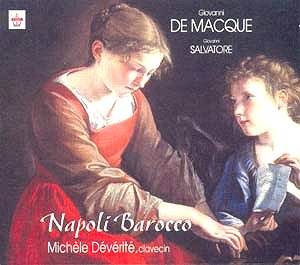Harpsichord Pieces by Giovanni da
MACQUE and Giovanni SALVATORE
Giovanni SALVATORE** (1620-1688)
Toccata prima del primo tuono finto ** [3.18]
Corrente Prima ** [0.45]
Canzone francese seconda del nono tuono ** [4.00]
Corrente Seconda ** [1.02]
Canzone francese terza del primo tuono finto ** [4.20]
Canzone francese quarta del settimo tuono naturale sopra il ballo detto la
Bergamasca ** [4.32]
Toccata seconda del nono tuono ** [3.26] |
Giovanni da MACQUE* (1548-1614)
Prima gagliarda * [1.00]
Capriccietto * [2.22]
Canzona alla Francesca * [2.12]
Partite sopra Ruggiero * [3.19]
Capriccio sopra rÈ, fa, mi, sol * [5.26]
Consonanze stravaganti * [1.52]
Seconda gagliarda * [1.25]
Seconda canzon * [2.54]
Seconde Stravaganze * [1.45]
Durezze e Ligature * [2.29]
 Michèle
Dévérité, harpsichord Michèle
Dévérité, harpsichord
Rec: June 1999.
 ARION ARN 68476
[58.45] ARION ARN 68476
[58.45]
Arion |
 |
|
These two composers, who both lived in Naples, are little known, but their
works had a great deal of influence during their lives. Giovanni Da
Macque, who was Flemish, was a composer of madrigals and organist in
Rome. He moved to Naples in 1585, where he would spend the rest of his life
as an organist and chapel master. Giovanni Salvatore, born a few years
after Da Macque's death, was also an organist and chapel master in Naples.
Da Macque can be seen as the founder of the Neapolitan school of music, with
its wide range of styles and inventions, and Salvatore, who clearly inherited
this style, was considered one of the greatest composers of his time, even
more so than Frescobaldi.
Da Macque
The piece Canzona alla Francesca begins with a simple melody, and,
while not being a fugue, develops this melody in an interesting manner. This
does, indeed, have a French sound to it, as the title suggests, recalling
some of Louis Couperin's works, with subtle ornamentations, and simple melodies.
The other works have a familiar sound as well - the sound of harpsichord
composers such as William Byrd can be heard in some of these pieces, yet
with a different kind of rhythm. The moving, somewhat free piece, Capriccio
sopra ré, fa, mi, sol, features a variety of harmonic inventions
and rhythmic changes. Da Macque's works clearly fit in with Renaissance
keyboard music, yet have many differences that make them stand out as unique.
Salvatore
Canzone francese terza del primo tuono finto is a delightful piece
that opens with a fugal section, and continues through a series of variations,
moving through several sections like a toccata. Salvatore's unique use of
chromaticism can be heard here - he had a penchant for odd chromatic passages,
and these take on all their interest with the lovely instrument used on this
recording, which is tuned in meantone. Canzone francese quarta del settimo
tuono naturale sopra il ballo detto la Bergamasca begins in a similar
manner, opening with the exposition of a fugal subject, and developing it
through several appearances. The basic subject sounds almost like a children's
song, but, as it is developed, it takes on a more stately sound, revealing
the French influence in this piece. This is the same subject used by Frescobaldi
in his Fiori Musicali - Salvatore presents a true talent for counterpoint
in this work, as its several sections continue in variations on the original
theme.
What stands out most about this recording is the extraordinary sound of the
harpsichord, and the totally passionate interpretation by Michèle
Dévérité. Midway between introverted and flamboyant,
she seems to have discovered the perfect register for each piece. In some
cases this involves a subtly balanced ornamentation, as in the variations,
Partite sopra Ruggiero. In others, such as Capriccio sopra ré,
fa, mi, sol, she plays the slower sections with amazing expressiveness,
then executes dazzling runs along the keyboard with virtuosity.
A beautiful recording of some little-known composers from 16th and 17th century
Naples, performed with verve and emotion on an excellent harpsichord. A disc
to discover!
Kirk McElhearn

